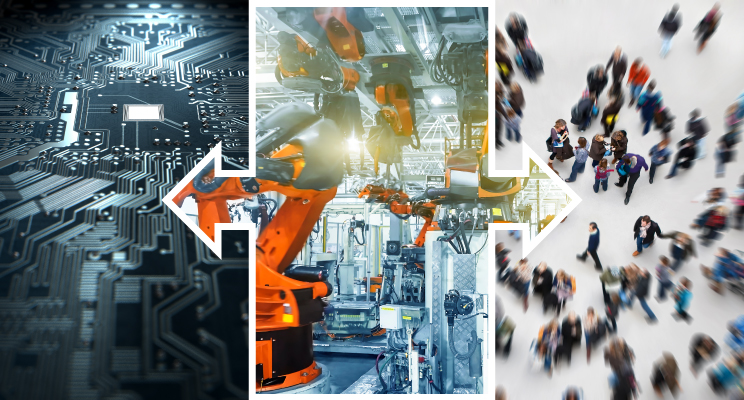How Technological and Industrial Trends Impact on Society Evolution and the Economy
In an increasingly complex world, traditional paradigms fail to adequately capture the nature of interdependencies. This applies in particular to technological innovations and their social and economic impact. We need to find a holistic approach that helps us improve our understanding and planning.
Today, major technology and industry trends together with societal and economic evolution form a complex puzzle. An understanding of the evolution of all these elements and how they evolve is crucial for an overall optimization of this puzzle. To reach such an understanding, the analysis of the mutual interaction of these elements is an important tool. We should aim to establish such an analysis in order to create a conceptual basis for the aforementioned mutual interaction, even if that conceptual basis cannot be either exhaustive or generally accepted.
Three Major Technological and Three Major Industrial Trends
The proposed conceptual basis can be visualized as being on three levels that are parallel to one another: the technology trend level, the industry trend level, and the level of societal change. These levels interact with one another. From a high-level perspective, we can state that all of todays’ major technological developments fall into one or more of three major technological trends; new manufacturing techniques (including biological processes for new types of medicine, artificial organ technologies etc.), digital technologies (e.g. Internet of Things, AI, Robotics, Mixed Reality, Edge Computing) and technologies related to resource generation, management, and access. Technology trends are at the origin of the creation of industrial trends (including all subsequent value creating economic activities, e.g. service provision), which can themselves be categorized into three groups: new manufacturing paradigms, digitalization, and the complexification of products and value chains.

In turn, industry trends impact societal evolution and create new economic effects. Both society and the economy are closely linked to politics and the environment. For brevity in the present analysis, when using the terms society and economy we understand them to implicitly incorporate politics and the environment, the former as a regulator, the latter as constraint and boundary condition.
There exists a continuous interaction and convergence between technological trends. Convergence happens in multiple ways: between technical disciplines; between design, manufacturing, assembling, testing and usage or between the technology and its application. A new key factor that has appeared over recent years is the presence of data. This is the result of the intense digitalization of our economy and society. Data is also the oil tht lubricates all these interactions, resulting in both their acceleration and their strengthening. This acceleration and strengthening of interactions, in turn, allows the creation of even more data, in an upwardly spiraling mode.
The Interdependence Between Technologies and Business Models
Perhaps the very fact of understanding the situation, i.e. the evolutions of this complex puzzle, allows us to see more clearly not only that technologies are influencing business models, but that in turn business models modify the competitive arena by rendering it more complex, in particular by integrating products and services. Long-standing dogmas need to be reconsidered: the claim that manufacturing can be on one side of the world and engineering and R&D services on the other has clearly been disproven. Adam Smith’s theories on specialization do not address the process of innovation, but rather speak of specialization in terms of specific products (or services), and in such a light remain absolutely valid. It is the process of technological innovation that cannot be geographically split.
No Data Without Devices
Data are extremely valuable, but they cannot exist alone; they need technological tools—which rely heavily on hardware—simply to exist but also to generate value. In comparison to digital technologies, which are increasingly characterized as Deep Tech a term that encompasses technologies that are based upon intense and excellent scientific and / or technological R&D endeavors, data seem to be over-appreciated: society and the economy get excited about “data” while forgetting the tools that are needed to get them. Without digital devices and advanced algorithms (based on digital technologies) data cannot generate value. Further, data seem also to be over-appreciated when compared to resources: without adequate resources (e.g. energy, bandwidth, storage capacity) data cannot be collected and exploited.
Last but not least, we see that our world is becoming technology dominated, in particular if manufacturing or the importance of technologies in securing global access to elementary resources such as food and water are taken into account. An understanding of the continuous flow of the endless interaction between technological and industrial trends as well as the impacts on society and the economy should become central to medium and long-term planning and analysis at the macroeconomic and economic levels, by respectively political and business leaders.
Information
Dr. Georges Kotrotsios, georges.kotrotsios(at)csem.ch
The Autor
SATW member Georges Kotrotsios is Vice President Marketing and Business Development, Member of Executive Board of the Swiss Centre for Electronics and Microtechnology (CSEM). CSEM is a private, non-profit Swiss research and technology organization focused on generating value for a sustainable world. Georges Kotrotsios studied electrical engineering at Aristotle University in Thessaloniki and at the Institut polytechnique de Grenoble, where he obtained a Ph.D. in optoelectronics. Furthermore, he holds an MBA in technology management from the University of Lausanne.

- Tags:
- digitalisation
0 comments